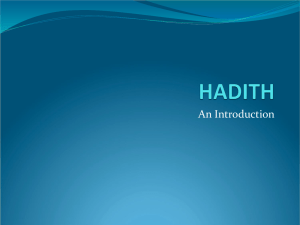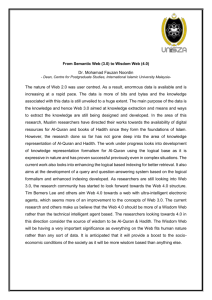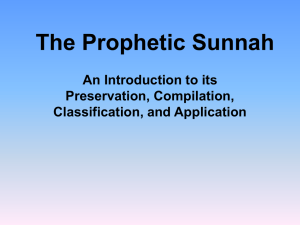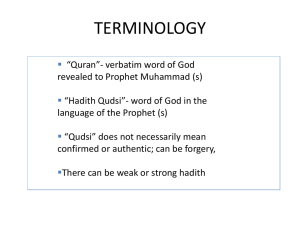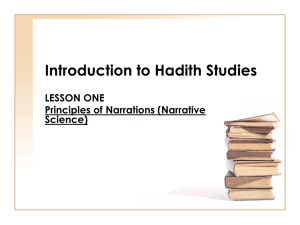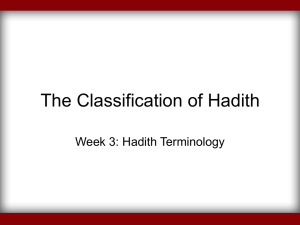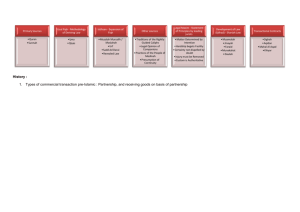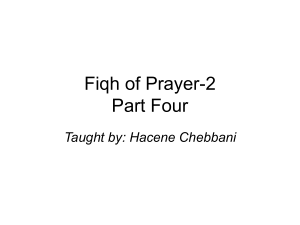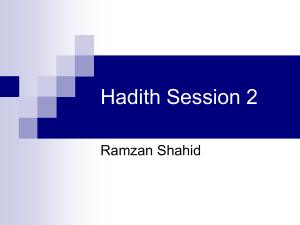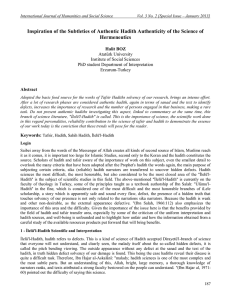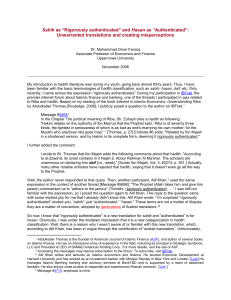ENGILA-Sample Syllabus
advertisement
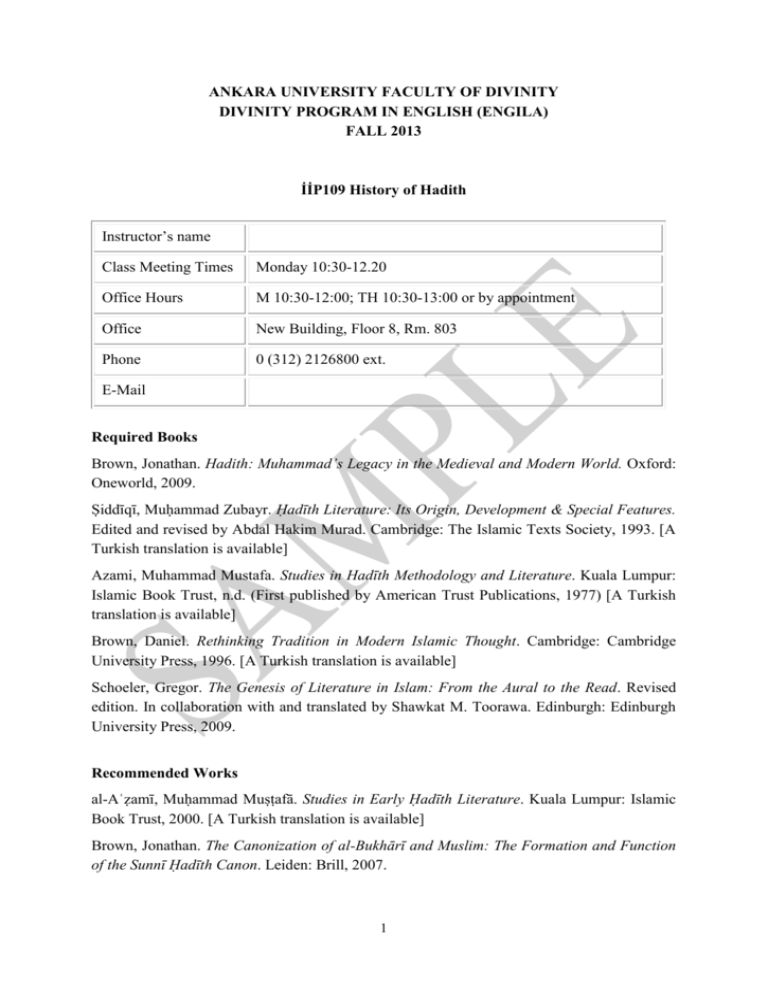
ANKARA UNIVERSITY FACULTY OF DIVINITY DIVINITY PROGRAM IN ENGLISH (ENGILA) FALL 2013 İİP109 History of Hadith Instructor’s name Class Meeting Times Monday 10:30-12.20 Office Hours M 10:30-12:00; TH 10:30-13:00 or by appointment Office New Building, Floor 8, Rm. 803 Phone 0 (312) 2126800 ext. E-Mail Required Books Brown, Jonathan. Hadith: Muhammad’s Legacy in the Medieval and Modern World. Oxford: Oneworld, 2009. Ṣiddīqī, Muḥammad Zubayr. Ḥadīth Literature: Its Origin, Development & Special Features. Edited and revised by Abdal Hakim Murad. Cambridge: The Islamic Texts Society, 1993. [A Turkish translation is available] Azami, Muhammad Mustafa. Studies in Hadīth Methodology and Literature. Kuala Lumpur: Islamic Book Trust, n.d. (First published by American Trust Publications, 1977) [A Turkish translation is available] Brown, Daniel. Rethinking Tradition in Modern Islamic Thought. Cambridge: Cambridge University Press, 1996. [A Turkish translation is available] Schoeler, Gregor. The Genesis of Literature in Islam: From the Aural to the Read. Revised edition. In collaboration with and translated by Shawkat M. Toorawa. Edinburgh: Edinburgh University Press, 2009. Recommended Works al-Aʿẓamī, Muḥammad Muṣṭafā. Studies in Early Ḥadīth Literature. Kuala Lumpur: Islamic Book Trust, 2000. [A Turkish translation is available] Brown, Jonathan. The Canonization of al-Bukhārī and Muslim: The Formation and Function of the Sunnī Ḥadīth Canon. Leiden: Brill, 2007. 1 Lucas, Scott C. Constructive Critics, Ḥadīth Literature, and the Articulation of Sunnī Islam: The Legacy of the Generation of Ibn Saʿd, Ibn Maʿīn, and Ibn Ḥanbal. Leiden: Brill, 2004. Dickinson, Eerik. The Development of Early Sunnite Ḥadīth Criticism. Leiden: Brill, 2001. Kamali, Mohammad Hashim. A Textbook of Ḥadīth Studies: Authenticity, Compilation, Classification and Criticism of Ḥadīth. Markfield: The Islamic Foundation, 2005. (Should be used with caution as the book contains tremendous amount of mistakes) Ad-Dihlawī, ʿAbd al-ʿAzīz (d. 1239 AH). The Garden of the Hadith Scholars = Bustān alMuḥaddithīn. Trans. From Persian to Arabic by M.A. Nadwī; translated from Arabic to English by Aisha Bewley. London: Turath Publishing, 2007. [A Turkish translation is available] Motzki, Harald (ed.). Ḥadīth: Origins and Developments. Aldershot: Ashgate, 2004. (A collection of 17 classical Western articles on hadith with an introductory section by Motzki) Shah, Mustafa (ed.). The Ḥadīth. New York: Routledge, 2010. (Contains 61 articles on hadith in 4 vols.: v. 1. Codification, authenticity -- v. 2. Isnāds: transmission, terminology, and the issue of dating -- v. 3. Scholarship, perspectives, and criticism -- v. 4. Narrative, context, and content.) Juynboll, G.H.A. The Authenticity of the Tradition Literature: Discussions in Modern Egypt. Leiden, Brill, 1969. [A Turkish translation is available] Juynboll, G.H.A. Muslim Tradition: Studies in Chronology, Provenance and Authorship of Early Ḥadīth (Cambridge: Cambridge University Press, 1983). [A Turkish translation is available] Abbott, Nabia. Studies in Arabic Literary Papyri II: Qur’ānic Commentary and Tradition. Chicago: University of Chicago Press, 1967. Especially pp. 1-92. Schoeler, Gregor. The Oral and the Written in Early Islam. Translated by Uwe Vagelpohl. Edited by James E. Montgomery. Abingdon: Routledge, 2006. Usmani, Muhammad Taqi. The Authority of Sunnah. Delhi: Kitab Bhavan, 1998. [A Turkish translation is available] Course Description The course offers a balanced introduction to the major figures and events of the history of hadith. Beginnings of hadith transmission, collection and classification of hadith, the development of the science of hadith and its history up until modern times will be discussed. Through the course, students should also be able to gain some familiarity with the hadith literature and the essential terminology of hadith. Requirements 1. A midterm exam. 2. A presentation or a paper 3. A final exam. 2 Grading 1. Mid-term exam: 40% 2. Final exam: 60% Grading 1. Mid-term exam: 30% 2. Presentation or paper: 20% 3. Final exam: 40% 4. Attendance and participation: 10% OR Course Syllabus Week 1 Sep. 16 General introduction Week 2 Sep. 23 Wider context of hadith; basic terminology Week 3 Sep. 30 Beginnings of hadith transmission; the age of companions (ṣaḥāba) and successors (tābiʿūn) Week 4 Oct. 7 Oral and written transmission of hadith; the question of writing down the aḥādīth; the use of isnād Week 5 Oct. 14 No class. FEAST OF SACRIFICE Week 6 Oct. 21 The collection of aḥādīth (tadwīn); classification of aḥādīth (taṣnīf); first hadith works and their nature Week 7 Oct. 28 Hadith forgery; beginnings of hadith criticism; development of terminology Week 8 Nov. 4 3rd century: the age of al-Bukhārī and Muslim and the rest of the six books (al-kutub al-sitta) and their reception Week 10 Nov. 18 4th-5th centuries; towards finalization of the hadith corpus Week 9 Nov. 11 No class. Week of MIDTERM EXAMS Week 11 Nov. 25 An overview of the development of Hadith literature in later centuries; relationship of hadith with the other disciplines; dār alḥadīth phenomenon Week 12 Dec. 2 Women scholars of hadith; hadith among non-Sunni Muslims; Shiite hadith; hadith and the Kharijites; Muʿtazila and hadith Week 13 Dec. 9 Western hadith studies; major figures and points of discussion Week 14 Dec. 16 Modern Muslim approaches to hadith; hadith studies today and in the future Week 15 Dec. 23 Conclusion and evaluation of the semester; what have we learned? 3
